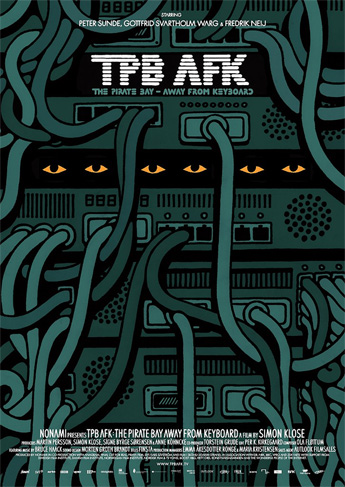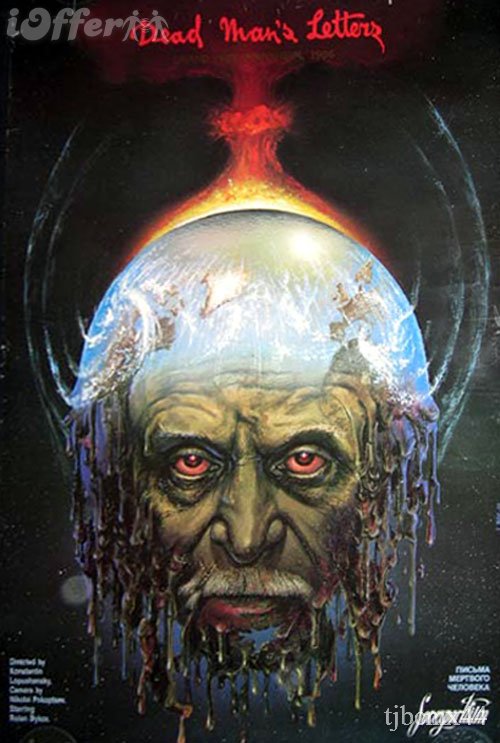Spread this movie.
Official site.
Download from The Pirate Bay.
Watch on YouTube.
Watch on SVTPlay.

I just saw a movie that was right up my alley (thanks for the tip, Claudio Marino!). I won’t tell you much about it, I think it’s better that way. What you need to know is that Beyond the Black Rainbow is a psychotronic kind of movie, where plot isn’t as important as aesthetics. This thing is beautiful! Along with the dark and brooding soundtrack (the main theme is obviously inspired by the masters: Goblin) it strives for perfection in the genre. Of course it has its’ flaws, but if you’re in the right mood: Crank up the volume and turn off the lights and this beast will hold you spellbound for almost two hours straight.
I feel the same vibe in movies like Inland Empire, The Limits of Control, Valhalla Rising, Eraserhead, Amer and maybe even Stalker, 2001: A Space Odyssey and some Cronenberg flicks. If you like that stuff, you’ll hopefully dig this one too.
Alejando Jodorowsky‘s The Holy Mountain (1973) is one of my all time favourites. It’s about symbolism, mainly focused on spirituality and the occult, death, rebirth, mysticism and the extramundane, but also on capitalist production, militarism and the absurd. The visual vocabulary is unique and absolutely stunning. Press pause in any frame at any time throughout the whole film, and you will get an image that constitutes the most amazing art. After all, Jodorowsky was trying with all his soul to make a sacred film. He wanted to change mankind with it, make it a source of enlightenment for the audience, and he believed that cinema was better than LSD…
The Holy Mountain has certainly changed me and the way I look at things, and most importantly the way I look at movies. In my eyes, this is pure gold/excrements. It operates on so many levels and is filled with so much detail, I believe you need to experience it several times to grasp its universal themes. Knowledge of the occult, religion and its’ most basic symbols is essential for understanding. Sometimes it comes out deep as fuck, and sometimes it does not (to put it simply, haha!)… That’s what I love with this piece of art: It rules even when it sucks!
These posts are based on Jodorowsky’s commentary track for the Anchor Bay DVD edition, as well as the book The Spiritual Journey of Alejandro Jodorowsky. You may want to watch the movie while you read this text, and hopefully, a deeper kind of understanding will emerge on your highway to hell/nirvana or whatever you may fancy.
Here are the first three minutes of the film, as explained by Jodorowsky in the commentary track:
First, a set decorated without furniture. It’s clean, like a hospital, with crosses on the wall to convey a sense of mysticism. There are only essential objects, like a sacred ceremony. The master’s outfit conceals his face. He hides his face, like Mohammed. He is an essential being, without ego.
These are the actual movements of a Japanese tea ceremony. All the movements are conscious.
These two girls weren’t actresses. They wanted to have a spiritual experience. They were searching for their own truth, their naked truth.
[the camera sweeps across different images]
The inner God that opens in circles towards a greater consciousness.
A heart that opens towards a greater consciousness.
The target that the arrow must hit.
The eye of Buddha.
The pearl, the soul that must be polished.
When the door is opened, a key is found with the trilogy.
Now, descend into the world of the dead, to the world of the dreamless dreams.
Descending…
Butterfly wings symbolize metamorphosis.
Back up through the serpent, Kundalini… the pearls of Eros, until it arrives at a geometric figure, which is the interior consciousness.
After this three minute introduction filled to the brim with symbols of the occult, we meet the protagonist, the Christ like figure, the Thief, lying on the ground, and who through the course of the film will experience moments of enlightenment. Jodorowsky continues:
He’s ”The Fool” of the tarot. His face is covered with flies, symbolizing useless thoughts. He is urinating on himself. He’s drunk and lost. This is the card that defines him, the tarot’s Fool card. The Fool is always represented by an animal that is his ego. The frog is the ego.
To be continued in Part Two.
There are two movies on my Worship Deluxe List: Apocalypse Now (1979, Francis Ford Coppola) and Stalker (1979, Andrej Tarkovskij). These are movies that deal with life, death and the unfathomable power of consciousness, spiritual enlightenment, turbulence and confusion. They work on so many levels, using cinematography and psychology in such subliminal ways it’s almost an hallucinatory experience watching them.
Having endured Konstantin Lopushansky‘s Pisma Myortvogo Cheloveka (Letters From A Dead Man aka Dead Man’s Letters (1986)), I might add it to the list. Lopushansky apparently worked with Tarkovskij on Stalker as a production assistant, and here he takes it to the next level: Nuclear winter, death and dying. It’s release coincided quite well with the Chernobyl distaster…
This is by far the most realistic post-apocalyptic vision I have ever experienced (alongside Threads, that is). It’s severely dark, haunting, and utterly depressing, and the screen is literally glowing of nuclear waste. There are no Mad Max haircuts in this one. It’s not funny or cool. It’s about emotional disintegration and the total resignation of life.
Almost all of existence above ground is wiped out. The environment is toxic. A few survivors finds a home in a bunker, and a physicist writes letters in his mind to his young son who went missing during the chaos. His wife is dying from radiation sickness. The days are as black as night, and the few remaining souls are contemplating death.
If you are a bit like me, you will contemplate what life really is after having watched this one.

The rest of this post is kind of spoiler-like, so you might wanna consider stop reading here.
There are so many memorable scenes, both beautiful, moving and disturbing. The one that really got me is when a survivor praises the achievements of humanity, and then commits suicide.
An absolute masterpiece.
All evidence suggests that the history of mankind has ended. It is time to sum up the outcome, and I think it should be done calmly, without vulgar affectation.
Today I want to talk to you like a dead man to other dead men. That is – frankly.
Let me present to you a speech for human beings as biological species.Mankind was a tragic species, doomed perhaps from the very beginning. Our fatal and beautiful fate was to always attempt to bite off more than we can chew, be better than nature intended. We found a place in ourselves for compassion, even though it was conflicting with the law of survival. We managed to feel self-respect, even if it was always trampled on. We created art masterpieces, comprehending their uselessness and frailness. We found in ourselves the ability to love. Oh Lord, it was so difficult! For inexorable time caused our bodies, thoughts and senses to decay.
But man continued to love. And love created art, an art which reflects our unbearable yearning for perfection, our immense despair and our endless cry of terror, a howl of desolate thinking creatures in the cold and impassive space desert.
In this room, a lot of hateful words had been said about mankind, contemptous and scornful. But I won’t throw a stone at it today. That is what I say: I loved mankind. I love it even better now that it no longer exists. I love it for its tragic fate. And I want to say to you, colleagues, I want to say that I love you. Perhaps that is my leap of consciousness, but I wanted you to know.
Now I will go to my room and everything will end for me.
After all, we are all adults, and death is not a frightening thing when everything has died.
——————
OTHER GREAT MOVIES OF THE 80’s:
Manhunter (1986)
A Short Film About Killing (1988)
Threads (1984)
The Quiet Earth (1985)
The Thing (1982)
The Plague Dogs (1982)
Altered States (1980)
Kenneth Anger‘s Lucifer Rising (1972) must be one of the most ambitious independent films made to date. It took over eleven years to complete, with locations spanning the temples of Karnak and the pyramids of Giza in Egypt to Germany’s Black Forest to Stonehenge, as well as India, Iceland, and lots of locations in the United States. Knowing that Anger chose to work mostly by himself, controlling all aspects of film production (his ability to direct, light, photograph, costume, create props, edit and produce is legendary) and working with an extremely modest budget, most of it self-financed, the end result is nothing but astonishing.
The visual inspiration must be traced to Aleister Crowley‘s poem Hymn to Lucifer, which in turn recalls John Milton’s epic poem Paradise Lost (1667). Lucifer is, in both Milton’s, Crowley’s and Anger’s eyes, the representation of beauty and light, the light bearer, the morning star, and so forth… In Gnostic myth, Lucifer was/is a pre-Judeo-Christian deity, identified with the fallen angel cast out of Heaven. The Gnostics worshipped Lucifer as the Herald of the Dawn, the light preceding the sun. This myth was then suppressed by the Catholic Church.
Marquis de Sade held that it was evil that was man’s prime motivation toward pleasure. Baudelaire tried to ”extract beauty from evil”, as did Milton in Paradise Lost and Dante in The Divine Comedy. It was in this symbolic context that Kenneth Anger found inspiration, and as early as 1954, in Inauguration of the Pleasure Dome, Anger explored different psychedelic states of consciousness. In a way, Lucifer Rising is ”with its themes of demonic possession expressed through the loss and recovery of psychic and physical power” (Alice L. Hutchison, Kenneth Anger) the ultimate of Anger’s manifestations, sort of stating that all these themes – the journey, the quest, the beauty, the darkness, the sublime and the psychedelic experience – are related. It’s the perfect combination of everything and nothing – showing another existence different from rational awareness. It’s like dreams that ”attempt to bring order to the unruly emotions and desires repressed by the social constraints of everyday life” (Hutchison). Anger himself consider Lucifer Rising to be the one film, alongside Scorpio Rising (1964), that came closest to his vision.
Robert Haller: ”To watch the film is to become intensely aware of the kinds and qualities of light, of its presence and absence, of its force.”
Before the film’s completion, Anger had this to say:
”The film Lucifer Rising is my answer to Scorpio Rising – which was a death mirror held up to American Culture. […] I call it a love vision, and it’s about love – the violence as well as the tenderness… […] Lucifer is the Rebel Angel behind what’s happening in the world today. His message is that the ‘Key of Joy is Disobedience’.”
When done filming, but not editing:
”Frankly, it’s taken me into some very strange corners… You see, I didn’t think it was about demons or hell, really. I was trying to make a film about the Angel of Light. That was his first name. The Son of the Morning, you see. But now I almost believe what the Bible says.”
Kenneth Anger’s interest in sound led to experimental collaborations with Mick Jagger (creator of the soundtrack for Invocation of My Demon Brother (1969)), Marianne Faithfull (who starred in Lucifer Rising), Jimmy Page (who began composing for Lucifer Rising, but got fired) and the infamous Bobby Beausoleil (whose music appeared in the final re-edited version of Lucifer Rising). Anger argued that rock’n’roll embodied the rebellious spirit of the times.
 As for Lucifer Rising, Anger had 17 hours of film and had been using the film-editing facilities in the basement of Jimmy Page’s Victorian mansion in London to trim it down. One night Anger was ordered by Page’s girlfriend to leave the house. No reason was given for his eviction, and his work was terminated, and so was Jimmy Page’s work on the soundtrack. The media reports of these events led to Beausoleil contacting Anger about making music for the film. Since Beausoleil was held captive in prison for his involvement with the Charles Manson murders, the instruments were delivered by mail order and Anger provided him with the time-sheet for the film. The result is amazing. That Bobby Beausoleil’s last name is roughly translated to ”beautiful sun” is yet another detail related to the concept of light.
As for Lucifer Rising, Anger had 17 hours of film and had been using the film-editing facilities in the basement of Jimmy Page’s Victorian mansion in London to trim it down. One night Anger was ordered by Page’s girlfriend to leave the house. No reason was given for his eviction, and his work was terminated, and so was Jimmy Page’s work on the soundtrack. The media reports of these events led to Beausoleil contacting Anger about making music for the film. Since Beausoleil was held captive in prison for his involvement with the Charles Manson murders, the instruments were delivered by mail order and Anger provided him with the time-sheet for the film. The result is amazing. That Bobby Beausoleil’s last name is roughly translated to ”beautiful sun” is yet another detail related to the concept of light.
Kenneth Anger made his first movie when he was nine years old. When Scorpio Rising was released in 1963 it became the most viewed underground film in history. Anger still didn’t have enough money to truly realize his grand visions, and was unable to complete most of them. ”Money has always been a problem, and it made me give up on a lot of projects”. One of these movies that to my knowledge is still unfinished is a portrait if his friend Elliot Smith. He also made plans for a documentary about the German colony Nueva Germania in Paraguay, which was founded by Nietzsche‘s sister Elisabeth Förster-Nietzsche. According to Anger the place holds a lot of inbreds…

Still to this day, at the age of 85, Anger refers to himself as a thelemite, a follower of the spiritual philosophy Thelema developed by Aleister Crowley. In the 1940’s, Anger started to collect Crowley books and manuscripts, and obviously his collection is huge (probably not as huge as that of Jimmy Page, though, whose collection is rumoured to be the second largest in the world. Page also owns Crowley’s former residence at Boleskin, Loch Ness).
By the way, the Jimmy Page soundtrack is available again, remixed and all that, along with other soundtracks on this beautiful album:
Some say that Altered States (1980) is the ultimate trip movie. Hallucinogenic drugs that bring about apocalyptic biblical visions rule, but I must admit that the magic won’t last until the very end. It’s actually damned cheesy. But hey, this is the eighties, and if you know your Bible, the message is quite cool. Ultimately, it’s about the death of God and the origins of man.
And I beheld, and, lo, in the midst of the throne and of the four beasts, and in the midst of the elders, stood a Lamb as it had been slain, having seven horns and seven eyes, which are the seven Spirits of God sent forth into all the earth.
Revelation 5:6
Yes, the seven-eyed lamb appears in the first vision, and it takes off from that.
This film is kind of a variation of the old ”mad scientist” theme, with Dr. Jessup using himself as a guinea pig for the psychedelic experience. He’s hallucinating in his isolation tank, and it all connects to the ecstatic religious visions he had as a teenager, the loss of his father, and thus the loss of faith. He wants to dig deeper and seek the outer limits of consciousness, and so he travels to Mexico to take magic mushrooms with the shamans. That’s when the real trip begins, back to the roots, literally speaking. The dude is genetically regressing to a pre-human being, ultimately regressing into the void of existence.
Despite the flaws, Altered States is well worth watching, mostly because it’s so damned weird. The effects are awesome (the 3D youth of today will not agree, but that’s a degenerated generation), the soundtrack is freaky as hell, and in combination with the message this makes for quite an astonishing trip.
The film is based on the novel with the same name by Paddy Chayefsky, but also on the experiences of scientist, writer and drug user John Lilly, perhaps most known for inventing the sensory deprivation tank.
Read this great interview with the man for an even more extensive movie experience.
When being asked about orthodox scientists’ accusations of Lilly’s unscientific practices, Lilly gives a great answer:
I was brought up to divide science into theory and experiment, each guiding the other. The pure experimentalists who attack me lack good theory, but the theorists haven’t done the experiments. There are really three departments to science: experiment, theory, and experience. Experience is the part that doesn’t get into the scientific journals.
—
OTHER GREAT MOVIES OF THE 80’s:
Manhunter (1986)
A Short Film About Killing (1988)
Threads (1984)
The Quiet Earth (1985)
The Thing (1982)
The Plague Dogs (1982)
>
I know, this “trend” is as old as when piracy suddenly allowed every miffo out there to download Photoshop for free, but some of these are pretty cool.
However, here’s a slightly different take on the genre, since they are set in another time, featuring different actors, directors and so forth. I would love to see Fritz Lang’s German adaptation of 2001: A Space Odyssey, not to mention Akira Kurosawa’s version… That would seriously slay.
If I had the skills, I’d make a bad ass poster with Klaus Kinski starring in Blade Runner, rewritten by Alan Moore and simultaneously directed by Alejandro Jodorowsky and Kenneth Anger.
Soundtrack: Sunn 0))), Godspeed You Black Emperor, Clint Mansell and Burzum.
What about that? Yes, awesome.
Posters stolen from Peter Stults and Hartter.
Related posts:
Czech film posters
Modern film posters
British propaganda posters
American propaganda posters
German propaganda posters